Over the past few entries of this series I talked about building rivals by using symmetry, and asymmetry. I wrote this series because Kabam had announced that the Leader would be introduced in their mobile game Marvel Contest of Champions. It got me thinking about all of the Hulk's rivals, and what made the Leader unique among them. I wanted to highlight these things in order to help new creators figure out how to build a great opponent. Yet with a character as overpowered as Superman from DC Comics, or the Hulk from Marvel comics how would one build a worthy rival? You could introduce a character so physically impossible to beat that they could kill the hero. It was a sometimes cheap trick that writers would use to make the threat seem unstoppable. See the genetically-altered Kryptonian weapon Doomsday for example.
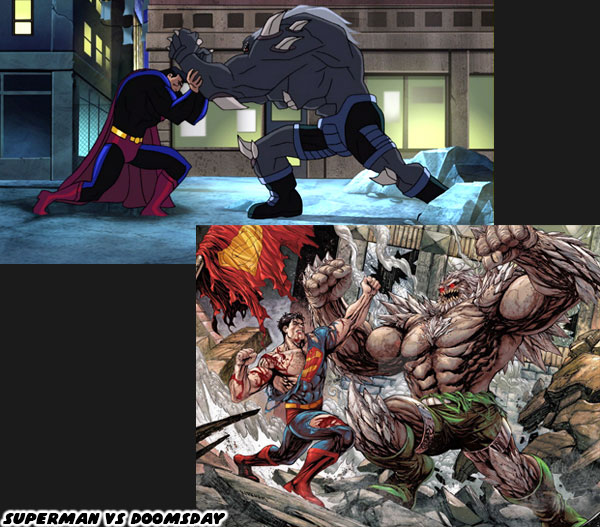
This type of character might generate a lot of interest, sell a ton of comics, but in the long run they would feel one-dimensional. Their gimmick would get boring. They would become relegated to secondary foes in later stories while a human like Lex Luthor offered a greater ongoing threat. Many people thought of the Hulk in a similar regard to Doomsday. He was absurdly powerful, adapted in battle, and could solve all his problems with his fists. Yet those people missed the nuance that the character provided. The Hulk was an allegory for war, nothing good came from fighting him. The green monster just wanted to be left alone. Doomsday was a weapon of mass destruction, by comparison the Hulk was a force of nature. Their appearance could wipe entire cities off the map, and nothing could stop them. The difference between the two was that Doomsday made the choice to destroy. Whereas the Hulk was pushed into it. Doomsday could adapt, his bones would become denser, his teeth sharper, he would secrete poison, but nowhere in his canon did he ever become exponentially stronger. He did have a limit, and Superman could find it. The Hulk could not be beaten if the opponent used only force. That's not to say he had never been beaten in physical combat.
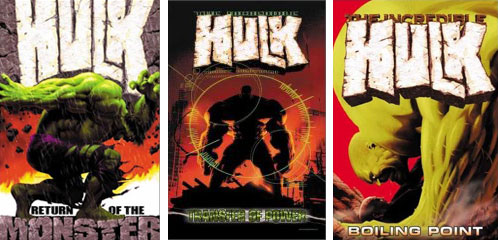
In fact a calm Hulk was weaker than the Juggernaut, and Abomination by a wide margin. To make up for this the Hulk had a healing factor much greater than Wolverine. Not only that but he never tired, he grew stronger with every passing second, he could eventually superpass the Juggernaut, and Abomination in a battle. If he continued fighting he would eventually rival cosmic-level threats. The best way to stop the Hulk was by never starting a fight. The Marvel editors considered him the "Nuclear Option." When they built a story that involved the entire universe they needed to figure out how to get Banner, and the Hulk out of the picture. For example during the events of the Civil War arc they literally sent the Hulk into space to have his own adventure. The editors knew that would have sided with Captain America, as he didn't get along with Iron Man. Also because the Hulk was against the type of authoritarian pushes that Tony Stark was supporting. The Marvel Universe would eventually have to deal with an angry Hulk upon his return home. But that would be saved for future arcs.
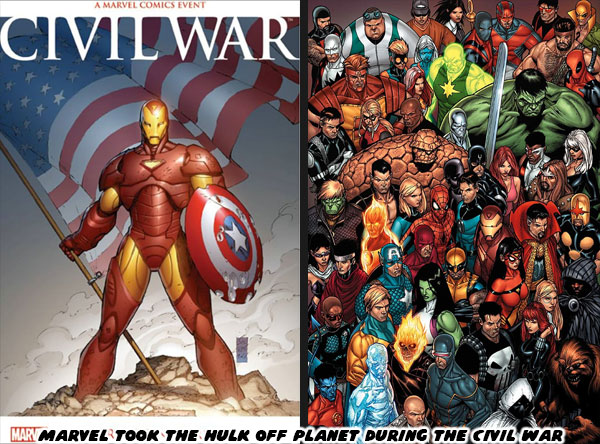
Marvel realized the Hulk could serve as both a villain, or a hero depending on the situation. So how was it possible to create a worthy rival for someone as absurdly powerful during normal character arcs? That's where asymmetric design would come in handy. The plans of the Leader, and his many inventions were not the only things that made him a menace. His level of psychic ability put him on a level that was rare, even in the Marvel U. As I stated earlier in this series, the Hulk was able to single-handedly defeat opponents that gave entire teams like the X-Men, and the Avengers trouble. That meant that the opponents he faced would have to be leagues above most super powered characters. Charles Xavier “Professor X,” the leader of the X-Men was considered the most powerful psychic in the Marvel U, yet he had been bested many times while trying to invade the mind of Banner. Erik Lehnsherr "Magneto" was also one of the most powerful mutants on Earth. During the House of M storyline mutants controlled most of the world, and oppressed humans. The Hulk took over the Australia, and made it a safe haven for humanity. Magneto wanted dominion over the continent, but the Hulk threatened him to stay out. Magneto realized he could not stop the Hulk if they went to war.
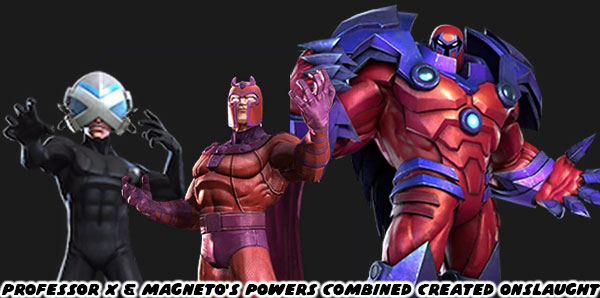
The closest the duo ever came to crushing the Marvel Universe was when their powers were combined, and a new villain named Onslaught was born. This character was so overpowered that the X-Men, and the Avengers couldn't stop him. They realized that the Hulk was their best chance. Yet during this time Bruce Banner, and the Hulk had found a sort of balance. They were at peace with each other, and in sharing a body, and soul. In order for the Hulk to become strong enough to face Onslaught they came to the realization that the personalities of Banner, and the Hulk had to become separated once more. If they did this then he might never be whole again. With the help of Jean Grey aka Marvel Girl the Hulk once again was reverted to a ball of rage. He was unleashed, and was quickly overpowered by the new villain. As anyone with a passing knowledge of the Hulk knows that the angrier he gets the stronger he gets. Onslaught made him absolutely furious. The Hulk eventually cracked Onslaught's armor, giving a chance for the teams to defeat him. Something that was glossed over in many retellings of the saga was that Banner had also defeated Onslaught when he invaded his subconscious. Essentially he beat him twice when no one else could.
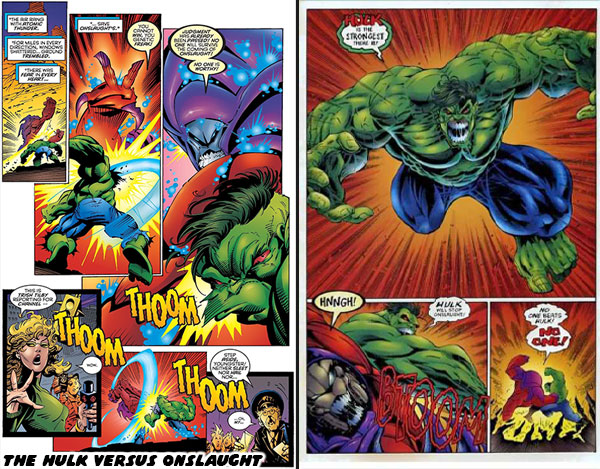
The victory against the monster was bittersweet. All the progress the Hulk had made, the goodwill he earned, and all the alliances he had built would be reset. It was the tragedy of Bruce Banner. For a moment he would be considered a hero. He stopped an enemy that the combined forces of the Marvel U could not. Once the dust settled both the X-Men, and the Avengers would eventually turn against him. Every other Marvel hero was rewarded for their powers. Bruce Banner was punished for his. This type of storytelling made for a very complex, and sympathetic character. That was why I would compare the Hulk comics to Mob Psycho 100, rather than One Punch-Man. Yes it was awesome when the Hulk could punch his way out of a problem, but the heart of the story was in literally warning the bad guy that they did not want to make Banner angry. Seeing the villains suffer the consequences was a reward, but the fallout would also set Banner back. Shigeo Kageyama aka Mob had a comparable dynamic. He wanted to get through school, and catch the eye of Emi, a girl he had a crush on. At the same time he knew his psychic abilities were powerful, and tried to keep his emotions in check so his powers would not explode. Unfortunately the pressures of growing up, and having rivals seek him out always ended with him losing control. These events would take a toll on his physical, and mental health.
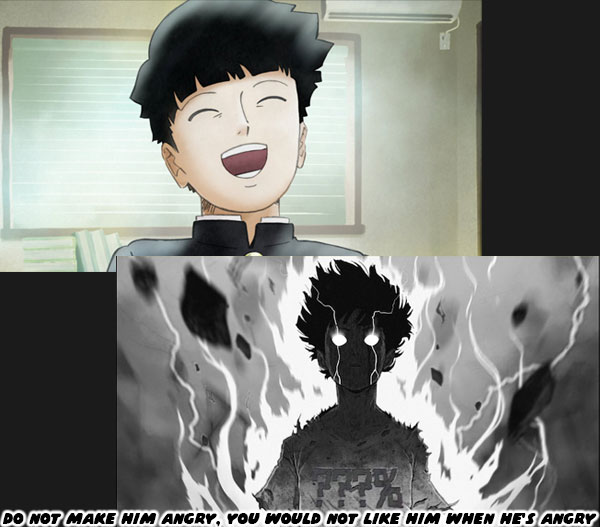
Mob Psycho 100 was essentially a retelling of the Bruce Banner mythos, but in Middle School instead of an Army Base. A cavalcade of villains with all sorts of different psychic abilities assumed that they could defeat the child. Each were humbled when Mob revealed the monster he had been suppressing. Even the final villain Toichiro Suzuki aka the Demon would find out that he shouldn't have bullied the kid. Mr. Suzuki believed that his power meant that he should rule the world. He was what Mob would have become if he didn't have a loving family, and mentors to help guide him. ONE managed to write a story that had Mob essentially doing battle with an older, and much more evil version of himself. It was similar to how Peter David managed to have the Hulk, and Maestro fight in the Future Imperfect arc. ONE wrapped up his series very well, so that he did not end up retreading the same ground like Marvel comics. If the Leader was not an evil version of the Hulk, then why was he such a great villain? How could a skinny guy with a big head be a problem for the Green Goliath? We will look at that in the next, and final entry of this series. Were you a fan of any of the aforementioned rivalries? Tell me about it on the comments section. As always if you would like to sponsor me
please visit my Patreon page and consider donating each month, even as little as $1 would help make better blogs and even podcasts!






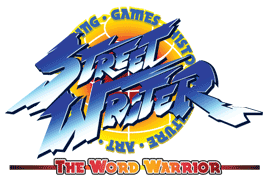
No comments:
Post a Comment